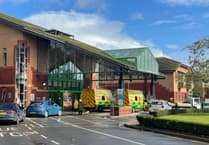Okehampton Hospital’s maternity beds could reopen if current efforts to recruit more midwives to staff them are successful, an NHS manager has said.
Sonja Manton, head of strategy at the North East and West Devon Clinical Commissioning Group, said ‘no decision’ had yet been made about whether to close the beds permanently.
The Royal Devon and Exeter NHS Foundation Trust closed the inpatient maternity beds at Okehampton Hospital in August due to staff shortages, just six weeks after an NHS Acute Services Review recommended that the midwifery-led unit at Okehampton should shut permanently. The review is recommending that women give birth at home or in hospital in Exeter 25 miles away.
‘At the moment we are struggling to safely staff the unit, a problem which is not unique to Devon,’ said Ms Manton. ‘We have a general recruitment problem in midwifery across the country. The maternity unit is a temporary closure, and we haven’t come to any permanent decision.
‘The Royal Devon and Exeter NHS Foundation Trust are doing their best to reopen the midwifery unit, and are going out to recruitment agencies to find staff. They are doing their best to reopen.’
She did, however, acknowledge that the CCG’s clinical services review had raised questions about the future of the maternity beds at Okehampton.
‘One of the recommendations of that, and it is a clinical recommendation, is that we implement midwife-led units alongside consultant-led units at hospitals in Devon. You have to ask yourself what the implication are for freestanding units like Okehampton (without consultants) and we haven’t answered that yet but we are in the process of doing that and that will resolve the long-term future.’
Responding to concerns raised about the distance women giving birth have to travel to hospital in Exeter, she said: ‘The challenge for us is when people choose to live in rural communities, there are implications for the services they can access remotely and we need to manage that as best we can. It is not just about the money, it is about patient safety and sustainability.’
The Times spoke to Ms Manton during a health and care information day held at the Ockment Centre in Okehampton last Friday, which was called to give residents a chance to talk to community and voluntary services working alongside the NHS to care for people in their own homes. Those present included Hospiscare and Marie Curie.
The meeting was called at the instigation of Okehampton county councillor Kevin Ball to answer residents’ concerns following the closure of the inpatient beds. The beds are typically used for convalescing by people discharged from the RDE. That care will now be provided at home, from nurses working from Okehampton Hospital, with voluntary agencies helping to fill the gaps.
Ms Manton stressed that the current closure of the inpatient maternity beds was a separate issue from the permanent closure of the inpatient beds.
‘The inpatient and maternity beds are very separate services so the decision about the inpatient beds does not reflect on the future of the maternity unit,’ she said.
‘We still have a midwifery centre in Okehampton, it is just the actual giving birth unit that is closed. The midwife unit is open from 8am to 8pm, and the midwives are there. If you live in Okehampton and want a home birth you can have one. And if you want a midwife-led unit you can go to the RDE or you can go to Tiverton hospital (which still has maternity beds).’
Okehampton mayor Jan Goffey said the meeting at the Ockment Centre had given people a chance to find out more about what services were there, in the wake of the hospital bed closures.
‘This is a wonderful event because it is pulling together the NHS and all the health and wellbeing services,’ she said. ‘There’s a range of services for people to find out about. It’s important because a lot of people don’t know about how we can support them. We are working together to support the hospital as a health hub so we can retain services as much as possible.’
Adele Jones, integration director at the Royal Devon and Exeter NHS Foundation Trust, was meeting people at the event.
‘I’m here to listen,’ she said. ‘When the inpatent beds closed in Okehampton we invested quite large amounts of money in home-based services. The number of community nurses has increased for the Okehampton area.’
Cllr Ball said he was pleased with the turnout. ‘The day has been very successful, as residents have had a chance to talk directly to the people who are providing health services. I’m really pleased that people have really engaged and asked questions and had the opportunity to have things explained to them. We are at a point where we need to work together — local authorities, providers and commissioners — to try and get the best solution for ourselves as a town and a wider community. Although they are not the solution in themselves, days like these are about helping bringing the right people together to find those solutions.’
Hugh Norman, the chairman of Okehampton Medical Centre’s Patient Participation Group, also at the meeting, sounded a note of caution about the NHS calling on charitable and voluntary agencies to provide care to people in their own homes.
‘The voluntary services are very important because they have resources that save the National Health Service money and you can see by organisations represented here that there are a lot. What people forget, though, is that while they may be voluntary agencies they have got to have money to do things.’
Community nurse team manager Jenny Lee, who leads the team of 25 nurses working in the community from Okehampton Hospital, was also present, meeting residents. ‘It is really encouraging,’ she said. ‘There’s a positive vibe here.’ She said that all the positions in her team were currently filled.



